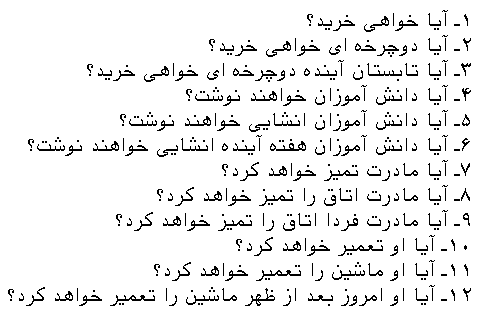As you know, practice makes perfect! These useful drills present even more words and phrases than covered in this week’s lesson. This will not only build your Persian vocabulary, but also help you learn to read and write Farsi more quickly and confidently.
Note: Before doing these homeworks, make sure you have learned the previous words fluently.
New words:
TabestanNext summer = ![]() /ta:besta:n-e- a:yændeh/.
/ta:besta:n-e- a:yændeh/.
Please translate the following sentences into Persian.
Note: the following structure is different from the request form of sentences such as “will you open the door, please?”
- Will you buy?
- Will you buy a bicycle?
- Will you buy a bicycle next summer?
- Will the students write?
- Will the students write a composition?
- Will the students write a composition next week?
- Will your mother clean?
- Will your mother clean the room?
- Will your mother clean the room tomorrow?
- Will he fix?
- Will he fix the car?
- Will he fix the car this afternoon?

Lorenzo
July 30, 2013 @ 5:05 pm
Hi Hassan, first of all, thanks a lt for this website. I leave in chile and without this help i never could learn this beautifull language. Regarding to the answers, i ve a doubt with plural of “students”. You wrote (دانش اموزان) and i thounk it was (دانش اموزها), why?
thanks a lot. Lorenzo
Brian
October 8, 2013 @ 8:34 pm
Lorenzo, you’ve probably already discovered the answer, but for the benefit of anyone else who might have the same question, ها can be used as a plural suffix for just about anything in colloquial Persian. ان is a plural suffix that is traditionally only used with living things (even plants & animals.) Either one could be used here.
Valentina
December 9, 2013 @ 12:16 am
why the “new” words from useful drills no 42 are the same with the ones at no 41 ?
Valentina
December 9, 2013 @ 12:23 am
so sorry ,my bad! i messed up pages …thanks a lot for your classes ,they are realy helpful and easy to remeber! you did a great job …
Luke
May 4, 2015 @ 12:07 am
Salaam, I have really enjoyed your site, it gave me my initial momentum for learning Farsi. I would like to know if Farsi uses double negatives. Like would you say “Har gaz khaaham raft” or “Har gaz nekhaaham raft”.
mohammad mj
July 17, 2015 @ 2:47 pm
“hargez nakhaaham raft”.in Persian you should always use double negatives meaning that by using “hargez” your verb doesn’t change into positive form unlike English.the same rule applies to all the tenses in Persian.